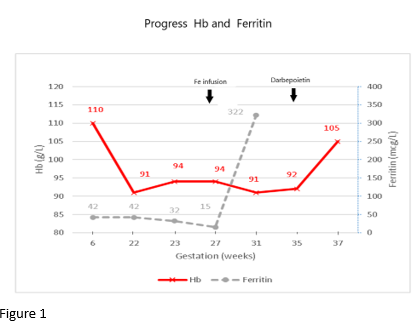SOMANZ Poster Presentation Australasian Diabetes in Pregnancy Society and Society of Obstetric Medicine Australia and New Zealand Joint Scientific Meeting 2025
Darbepoetin Therapy for Symptomatic Anaemia and Orthostatic Intolerance in Pregnancy with Beta-Thalassemia Trait (#178)
Background:
Beta-thalassemia trait in pregnancy may impair red cell mass expansion, leading to symptomatic anaemia and orthostatic intolerance. Erythropoiesis-stimulating agents (ESAs) such as darbepoetin may be effective in selected cases.
Case Presentation:
A 39-year-old G6P3 woman with beta-thalassemia trait presented in the late second trimester with disabling orthostatic presyncope and palpitations. Initial investigations revealed anaemia with normal iron studies, B12, and folate. Progress haemoglobin (Hb) and ferritin levels are shown in Figure 1. Despite iron infusion at 27 weeks’ gestation, symptoms persisted. Examination showed postural tachycardia (Heart rate 90 →120 bpm; from sitting to standing) without hypotension or dysautonomia. Serum cortisol was normal (466 mmol/L) and erythropoietin level was inappropriately low (20 mIU/mL). Non-pharmacological interventions and fludrocortisone (0.3 mg/day) were ineffective. Following informed consent, 30 mcg darbepoetin was administered, resulting in rapid symptoms resolution and increase in Hb to 105 g/L. She delivered at 38 weeks following spontaneous rupture of membranes, without complications.
Discussion:
Pregnant women with beta-thalassemia trait often develop worsening anemia due to ineffective erythropoiesis.1 Although erythropoietin levels increase during pregnancy, the response may be insufficient to correct the anaemia.2 In selected cases, the use of ESAs such as darbepoetin has shown benefit.3 Additionally, in non-pregnant individuals with POTS refractory to standard treatments, 71% showed symptom improvement with erythropoietin.4 It has also shown benefit in dysautonomia-associated anaemia and orthostatic intolerance.⁵⁻⁸
Conclusion:
Darbepoetin may be an effective option in beta-thalassemia trait pregnancies with symptomatic anaemia and orthostatic intolerance unresponsive to conventional therapy.

- Knox-Macaulay HH, Weatherall DJ, Clegg JB, et al. Thalassaemia in the British. Br Med J 1973; 3: 150–155. DOI: 10.1136/bmj.3.5872.150.
- Bianco I, Mastropietro F, D'Asero C, et al. Serum levels of erythropoietin and soluble transferrin receptor in the course of pregnancy in non beta thalassemic and beta thalassemic women. Haematologica 2000; 85: 902–907.
- Junca J, Vela D, Orts M, et al. Treating the anaemia of a pregnancy with heterozygous beta thalassaemia with recombinant human erythropoietin (r-HuEPO). Eur J Haematol 1995; 55: 277–278. DOI: 10.1111/j.1600-0609.1995.tb00277.x.
- Kanjwal K, Saeed B, Karabin B, et al. Erythropoietin in the treatment of postural orthostatic tachycardia syndrome. Am J Ther 2012; 19: 92–95. DOI: 10.1097/MJT.0b013e3181ef621a.
- Kim MK, Baek KH, Lim DJ, et al. Erythropoietin response to anemia and its association with autonomic neuropathy in type 2 diabetic patients without advanced renal failure. J Diabetes Complications 2010; 24: 90–95. DOI: 10.1016/j.jdiacomp.2009.02.002.
- Perera R, Isola L, Kaufmann H. Effect of recombinant erythropoietin on anemia and orthostatic hypotension in primary autonomic failure. Clin Auton Res 1995; 5: 211–213. DOI: 10.1007/BF01824009.
- Ando Y, Asahara K, Obayashi K, et al. Autonomic dysfunction and anemia in neurologic disorders. J Auton Nerv Syst 1996; 61: 145–148. DOI: 10.1016/s0165-1838(96)00070-7
- Winkler AS, Marsden J, Parton M, et al. Erythropoietin deficiency and anaemia in multiple system atrophy. Mov Disord 2001; 16: 233–239. DOI: 10.1002/mds.1063.